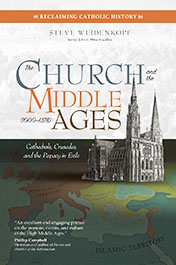The Church and the Middle Ages: Introduction
- MIKE AQUILINA
What's in a Name?
 Why is it that we mainly remember the Middle Ages by absurd things? When we talk of something medieval, we mean something quaint. We remember that alchemy was medieval, or that heraldry was medieval. We forget that Parliaments are medieval, that all our Universities are medieval, that city corporations are medieval, that gunpowder and printing are medieval, that half the things by which we now live, and to which we look for progress, are medieval. — G. K. Chesterton
Why is it that we mainly remember the Middle Ages by absurd things? When we talk of something medieval, we mean something quaint. We remember that alchemy was medieval, or that heraldry was medieval. We forget that Parliaments are medieval, that all our Universities are medieval, that city corporations are medieval, that gunpowder and printing are medieval, that half the things by which we now live, and to which we look for progress, are medieval. — G. K. Chesterton
No one living in the eleventh through the fourteenth centuries believed they were in the "Middle Ages." Indeed, German historians identified the years covered by the term when compiling medieval source documents.— Labeling historical time periods is a convention of scholars in an effort to organize human events into a definable and digestible configuration. The use of time periods to define history often produces raucous debate within the scholarly community. Periodization can be useful for pedagogical methods in an educational environment, but it can also be misleading and lead to false narratives that persist for centuries. Take, for instance, the commonly used word medieval to describe the centuries covered in this book. The term has a circuitous history with origins in the seventeenth century. Derived from the Latin words medium and aevum (middle ages), the word was originally intended as an insult, indicating the years between the ancient and modern worlds were nothing special.
It is not rare for "modern" historians, armed with a sense of superiority, to create words and phrases describing the past that are more a commentary on the prejudice of modernity than an accurate representation of past ages of human experience.— That's why it is no surprise that Protestant authors used the term medieval to disparage the Church, and Enlightenment authors solidified the modern understanding of the word as a synonym for barbaric, bloody, superstitious, primitive, bigoted, and intolerant, among others.— These thinkers believed the Middle Ages were, at best, a time of darkness suffocating human advancement and, at worst, the age of an overbearing, omnipotent Catholic Church bent on controlling minds and hearts with superstitious nonsense.
As a result, some historians argue the term should be abandoned not only for the associated negativity but also because the term encompasses a period (usually identified as 500–1500) too clumsy and too generic for useful study. Instead of discarding the term, perhaps it is time to change the negative undertones associated with it and see the medieval period for what it was: a time of penetrating activity in multiple areas of human life rooted in the knowledge of a loving and merciful God in whom human civilization and culture find their ultimate meaning and purpose. The story of the Church during these "glory years" is one of intense faith, grandiose adventures, and brilliant advancements in human achievement. Notwithstanding centuries of misrepresentation, the actions of the faithful men and women of this period and their accomplishments reverberate to the modern day.
 This is J. Fraser Field, Founder of CERC. I hope you appreciated this piece. We curate these articles especially for believers like you.
This is J. Fraser Field, Founder of CERC. I hope you appreciated this piece. We curate these articles especially for believers like you.
Please show your appreciation by making a $3 donation. CERC is entirely reader supported.

Acknowledgement
Mike Aquilina. "Introduction." The Church and the Middle Ages (1000–1378): Cathedrals, Crusades, and the Papacy in Exile (2020).
This article reprinted with permission from the publisher, Ave Maria Press.
The Author

 Mike Aquilina is vice president of the St. Paul Center for Biblical Theology. He is the author or co-author of fifty books including A History of the Church in 100 Objects, Seven Revolutions: How Christianity Changed the World and Can Change It Again, Yours is the Church: How Catholicism Shapes Our World, Good Pope, Bad Pope: Their Lives, Our Lessons, Love in the Little Things: Tales of Family Life, Living the Mysteries: A Guide for Unfinished Christians, Fathers of the Church: An Introduction to the First Christian Teachers, The Way of the Fathers: Praying with the Early Christians, and Praying in the Presence of Our Lord: With St. Thomas Aquinas. With Cardinal Donald Wuerl, he is the author of The Church: Unlocking the Secrets to the Places Catholics Call Home, and The Mass: The Glory, the Mystery, the Tradition. See Mike Aquilina's "The Way of the Fathers" blog here.
Mike Aquilina is vice president of the St. Paul Center for Biblical Theology. He is the author or co-author of fifty books including A History of the Church in 100 Objects, Seven Revolutions: How Christianity Changed the World and Can Change It Again, Yours is the Church: How Catholicism Shapes Our World, Good Pope, Bad Pope: Their Lives, Our Lessons, Love in the Little Things: Tales of Family Life, Living the Mysteries: A Guide for Unfinished Christians, Fathers of the Church: An Introduction to the First Christian Teachers, The Way of the Fathers: Praying with the Early Christians, and Praying in the Presence of Our Lord: With St. Thomas Aquinas. With Cardinal Donald Wuerl, he is the author of The Church: Unlocking the Secrets to the Places Catholics Call Home, and The Mass: The Glory, the Mystery, the Tradition. See Mike Aquilina's "The Way of the Fathers" blog here.


